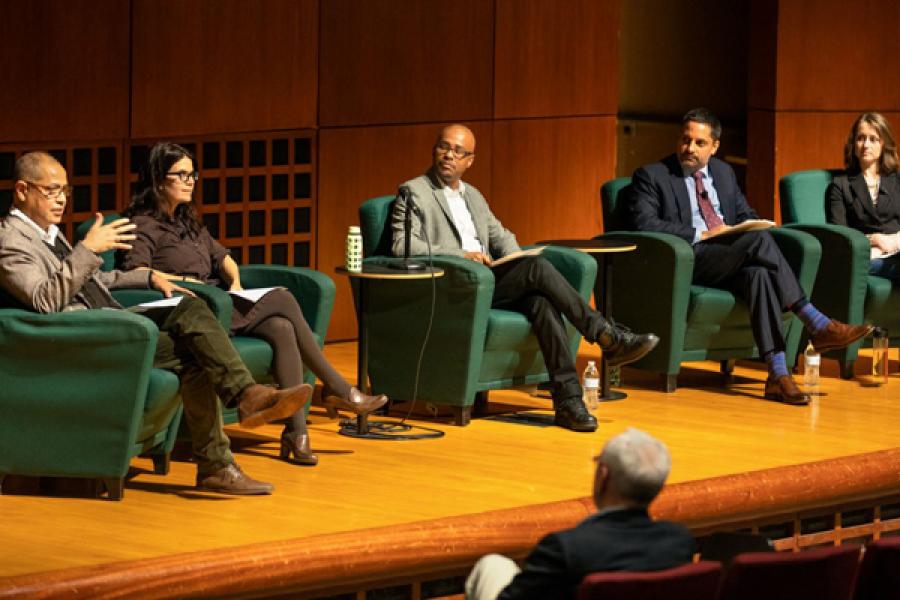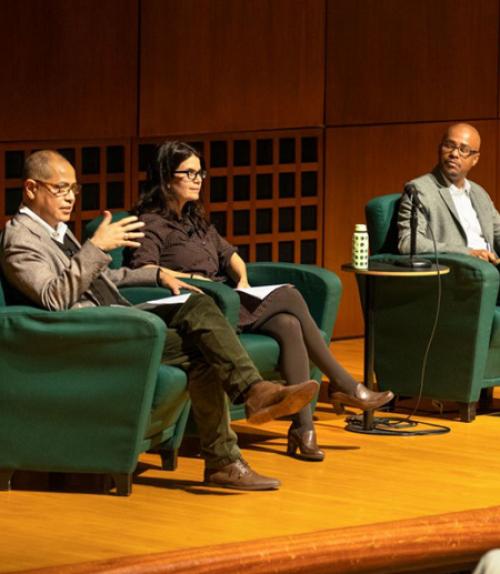Cornell’s founding declaration, “I would found an institution where any person can find instruction in any study,” and its promise of what Eduardo Peñalver ’94 calls “unpretentious excellence” attracted him to the university 30 years ago as an undergraduate in the College of Arts and Sciences. Now the Alan R. Tessler Dean and professor of law, Peñalver participated in a faculty panel discussion of Ezra's vision Oct. 30 in Kennedy Hall.
About 60 people attended the event, “Celebrating 150 Years of Ezra Cornell’s Promise: Reflections on What ‘…Any Person …Any Study’ Means.” Avery August, Ph.D. ’94, vice provost for academic affairs and professor of immunology, moderated the discussion.
“Today Cornell is rededicating itself to welcoming ‘any person,’ and we are also proudly celebrating this essential part of the university’s heritage, as well as its present and future,” said Provost Michael Kotlikoff.
He noted, however, that Ezra Cornell’s promise of 150 years ago and Andrew Dickson White’s vision described in a letter 156 years ago “to secure a place where the most highly prized instruction may be afforded to all regardless of sex or color,” remains a work in progress.
When Cornell opened its doors in 1868, few colleges welcomed African-Americans or women. Yet the first student of African descent arrived at Cornell in 1869, and the first woman in 1870. A man who escaped from slavery as a child was a member of the Law School’s first graduating class.
“This vision of racial and gender nondiscrimination was a radical one at a time when discrimination against women and people of color was the norm, enshrined in law and pervasive in higher education,” Peñalver said.
Today, about 43 percent of Cornell’s undergraduates are minorities. Women make up 52 percent of undergraduates and 43 percent of graduate students. More than half of all engineering undergraduates are female.
Melissa Ferguson, professor and chair of the Department of Psychology, pointed out that the implicit bias faculty and others may have about female students in STEM, for example, can impact how the students think of themselves and their ability to succeed.
She studies implicit cognition in humans – the beliefs and impressions people have without intention and often uncontrollably, rapidly and sometimes unconsciously. For example, she cited research by Lin Bian (who will join Cornell in January as an assistant professor in the Department of Human Development) finding people as young as 6 have the implicit belief that men are more likely to be brilliant than women.
“In my research,” said Ferguson, “we’ve been trying to figure out how to change these kinds of implicit beliefs and impressions. The bad news is that it can be difficult to change them, but the good news is that we’re learning that in some circumstances, it is possible.”
For Gerard Aching, M.A. ’90, Ph.D. ’92, professor of Romance studies and faculty member in the Africana Studies and Research Center, the graduate field system enabling multiple areas of study to be combined was particularly enticing as a graduate student, when the field of postcolonial studies was emerging. Rather than work separately through English, Spanish and French departments, as he would have had to do elsewhere, at Cornell he was able to make comparative inquiries into the 19th- and 20th-century Caribbean literatures of the Spanish, French, English and Creole-speaking Caribbean – and develop his own course of study.
“This became a connection between who I was – that is, my academic profile and aspirations as well as my life experiences – and the possibilities that I had for exploration, experimentation and opportunities to test hypotheses,” he said.
Natasha Holmes, assistant professor in the Department of Physics, researches how students learn physics.
“Any person can improve their performance in any study when using active-learning methods,” Holmes said. But she said that in lab courses, replicating experiments to verify an expert’s ideas does not engage students in the discovery process or enhance learning.
With support from the Active Learning Initiative in the College of Arts and Sciences, she is redesigning lab experiences where students create their own experiments and build investigations “to better demonstrate what science is really like – collaborative, creative and with a philosophy that espouses ‘…any person…any study.’”
The discussion was sponsored by the Office of Faculty Development and Diversity.
Lori Sonken is communication and program manager for the Office of Faculty Development and Diversity.





